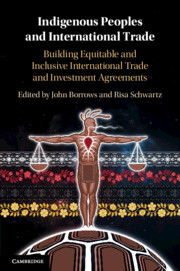 Indigenous Peoples and International Trade
Indigenous Peoples and International Trade from Part I - Indigenous Peoples and International Trade and Investment
Published online by Cambridge University Press: 11 June 2020
In Chapter 3, James Hopkins cautions that modern trade agreements benefit an elite few and that the agreements are reliant upon overly ambitious macroeconomic theories. There is a growing awareness that international trade’s net effect is widening the gap between economic winners and losers, much to the detriment of Indigenous peoples. In his chapter, Professor Hopkins examines the impacts of international trade on the Indigenous peoples of Mexico and provides some hope that the USMCA, if ratified, may be an improvement to the NAFTA, which has contributed to a dire human rights situation which threatens the lives and livelihoods of Indigenous peoples.
To save this book to your Kindle, first ensure [email protected] is added to your Approved Personal Document E-mail List under your Personal Document Settings on the Manage Your Content and Devices page of your Amazon account. Then enter the ‘name’ part of your Kindle email address below. Find out more about saving to your Kindle.
Note you can select to save to either the @free.kindle.com or @kindle.com variations. ‘@free.kindle.com’ emails are free but can only be saved to your device when it is connected to wi-fi. ‘@kindle.com’ emails can be delivered even when you are not connected to wi-fi, but note that service fees apply.
Find out more about the Kindle Personal Document Service.
To save content items to your account, please confirm that you agree to abide by our usage policies. If this is the first time you use this feature, you will be asked to authorise Cambridge Core to connect with your account. Find out more about saving content to Dropbox.
To save content items to your account, please confirm that you agree to abide by our usage policies. If this is the first time you use this feature, you will be asked to authorise Cambridge Core to connect with your account. Find out more about saving content to Google Drive.